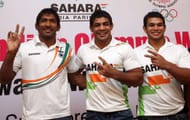Illegal holds
Punishing or brutal holds are not legal as they can result in severe injuries. They include choking, twisting of digits; striking the opponent with an elbow/knee, head butting, hair pulling, pinching, and/or biting. Some specific holds and/or moves on the head, arms or legs are banned because of extreme danger to the vertebrae and joints.
Headlocks without an arm included to bring an opponent's arm behind his or her back at an acute angle (also called a hammerlock) are also prohibited, a move that applies severe pressure to the neck or spine. The most dangerous hold is driving the opponent head first into the mat from standing position which can cause severe trauma to the cranium and neck.
In freestyle wrestling, the leg scissors hold with the feet crossed may not be applied to the head, neck or body, although it may be used on an opponent's limbs. In Greco-Roman of course, any use of the legs is illegal. These are however some of the most common violations in the Greco-Roman Style.
Awarding of Points
Takedown (Worth 1 to 5 Points) – When a wrestler gains control over the opponent from a neutral position with at least 3 points of contact to the mat.
- 5 Points – awarded for the execution of a takedown either from the standing or the par terre position into a direct or dangerous position
- 3 Points – awarded in which the takedown does not bring the opposition to a position of immediate danger or when the opponent is taken from his feet/stomach to his back/side
- 1 Point – awarded for a takedown that takes the opponent to his back/side from his feet/stomach without exposing back/shoulders to the mat
Reversal (worth 1 Point) – awarded when control over the opponent is gained from a disadvantage or a defensive position
Exposure/Danger position (worth 2 or 3 Points) – Points are awarded for holding the back/shoulders of the opponent to the mat. This is awarded even if it’s not a pin. An extra point is awarded for holding the position for 5 seconds or so
Penalty (worth 1 or 2 points) – Awarded to the opponent in case of a caution
Out-of-bounds (worth 1 point) – Awarded to the opponent if a wrestler steps into the protection zone
Tournament Structure
The first round is the Qualification round. If an excess of an ideal number (4,8,16,32 etc) say 22 wrestlers participate in an event, the players have to draw numbers randomly. The wrestlers who picked up the 6 highest numbers and the 6 wrestlers immediately above 17 play against each other to decide the final 16.
This is followed by the Elimination Round. In the elimination round, the wrestlers are pair off against each other and compete in matches until two finalists emerge victorious. Every wrestler who lost to the two finalists then have the chance to advance further in a repechage round. This feature makes the tournament structure of wrestling one of the fairest among all sports.
The repechage round starts with the wrestlers who lost to the two finalists at the lowest level of competition in the elimination round. The matches are paired off against the wrestlers who lost to one finalist and the wrestlers who lost to the other. The two wrestlers who win after every level of competition are the victors of the repechage round and awarded third and fourth place respectively.
In the finals, the two victors of the elimination round compete for the Gold and Silver respectively.
The Indian contingent for the 2016 Rio Olympics features eight wrestlers and there are high hopes for a few medals being bagged by these athletes. Here is the entire list of Indian Wrestlers gunning for gold.
Men
1) Yogeshwar Dutt (Freestyle 65 kg)
2) Narsingh Pancham Yadav (Freestyle 74 kg)
3) Sandeep Tomar (Freestyle 57 kg)
4) Hardeep Singh (Greco-Roman 98 kg)
5) Ravinder Khatri (Greco-Roman 85 kg)
Women
1) Sakshi Malik (Freestyle 58 kg)
2) Vinesh Phogat (Freestyle 48 Kg)
3) Babita Kumari (Freestyle 53 kg)

